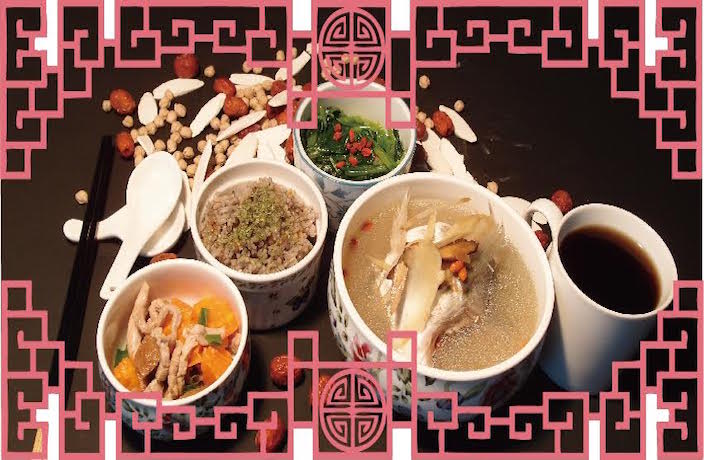China is a place of culture and tradition. Traditions may be adapted over time, but for the main, Chinese stay tried-and-true to their customs. Women are no exceptions, and for centuries, Chinese women have practiced zuo yuezi, otherwise known as ‘sitting-the-month’ or the ‘confinement month.’ And it is literally that—sitting.
Zuo yuezi refers to the month after giving birth when a woman needs to heal from the birthing process. If done in the traditional way, it comprises of staying inside, not eating cool or cold foods, not washing one’s body or hair, avoiding all wind or air conditioning, not brushing teeth and avoiding exercise or anything that may overwork the body. The whole idea is that the birthing process causes an imbalance of blood and heat, which are lost at birth; this one-month period gives time for a woman to regain her body’s heat and recover. The Chinese have taken into account how the body changes during pregnancy, including weight gain and strain on joints, bones, endocrine, skin and even the heart. The confinement month allows for all of these aspects of a woman’s health to become balanced once again.
Adapting to a More Modern Time
However, as the times change, customs will also adapt. Although the majority of women are still practicing traditional zuo yuezi, many are taking a modern spin on it. Gina Wu at Redleaf Hospital explains, “Zuo yuezi is a deeply planted cultural aspect in China, but as lifestyles change, the way of zuo yuezi might also change with the times. Though the general culture of it, believed for over 5000 years, will not change.” There are no questions whether the confinement month should be completed—that is a give-in for most women in China—but the styles are being modified.
For example, if completed in the traditional manner women are not allowed to wash their hair or body because of the potential cold and chills that come with using water. Now that there are hair dryers, this problem is solved as women can now wash their hair without sitting for hours with a wet head. Another example is that women used to eat three to eight eggs per day during this period in order to consume key supplements and nutrients from them; but this can become quite bland after a while. Now, women have more choices to intake the nutrients needed after childbirth and do not need to eat the same things repeatedly for a month.
Danielle Lu, a local Chinese woman in Shanghai spoke to us about her experience during the confinement month. She gave birth to a baby girl in 2014 and completed a more modern version of the practice. Although she agrees with the concept, she felt that adaptations were important in the process to benefit both her and her daughter. She explains, “I think it is the love between [my baby and I] that helped me to recover very quickly. I do agree that new moms should stay in bed to help their bodies get better; however, proper exercise is also conducive to the rehabilitation of the body; taking a walk in your room is a good way to do this. Also, I started taking showers every two days from the third day after the delivery. A clean mom is safer and more comfortable for her baby.” She also incorporated vegetables and fruit into her diet, which is usually not allowed during zuo yuezi.

Health Concerns from the West
Although Chinese women are faithful to the custom, there have been some questions regarding health and safety of moms from foreign doctors, particularly after a recent incident in 2015 where a woman died during the confinement month due to heat stroke when she was trying to avoid the cold. Doctors have voiced concerns that the lack of exercise and heat (particularly during summer months) is unsafe for new mothers.
A CNN report in 2015 questioned the practice of zuo yuezi and cited that even a traditional Chinese medicine doctor had encouraged mothers in a local newspaper to adapt the practice to modern society. He explained that new mothers should still avoid the cold, but could use fans if they weren’t pointed directly at them. The rules of not brushing teeth or washing hair have no substantial medical basis and can be done without causing any harm to the mother.
When asking local women whether there are health concerns, they answer “no” and that they have adapted what they think should change based on personal preference. Gina from Redleaf explained that there are no downsides to completing the confinement month; and with the new technologies and services coming out, women often overstay the intended 30-day cycle and now usually reside for two months in their hospital instead.
Shelling Out for Facilities & Confinement Centers
Completing zuo yuezi isn’t cheap, especially if you want to stay in a hospital or care center. Parents can shell out some serious kuai to get the full package of care at an upscale facility.
Take Ukang Maternity Center for instance, located on the sixth and eighth floors of the Hilton Hotel in Jing’An. This center provides a 24-hour nursing staff available for moms to use at any time for them and their babies. Looking into the nursery, at least eight babies were sound asleep with three nurses on staff. The facility provides up to six warm meals a day to new moms, as well as a Chinese tea that helps with the production of breast milk. Moms can take advantage of massages and other services that can assist them in the recovery process. Doctors come around to rooms everyday to check on the mom’s health and recovery.
Nicole Zhou, a local Shanghai mom who completed her confinement month at Ukang explains, “It is for both mom and child, but it is more so for moms to have a good rest after the birth. In the meantime they have professionals there to take care of the baby, but there is a very large focus on the mother.” She explained that she acquired a lot of knowledge through the baby classes for mothers. It allowed her to have a better understanding of her new baby and established confidence while she was simultaneously resting and recovering from the birthing process.
For those who choose not to use a facility, women can easily complete their confinement month at home but often hire an ayi or caretaker to assist with the baby.
Something to Learn
Although we couldn’t find a non-Asian woman who has completed zuo yuezi in Shanghai, this practice has been adopted across Asia. Facilities have also seen a major increase in mixed couples undertaking the confinement month, where the wife is always Asian and the husband is foreign. Although some husbands may be resistant to the practice, they show support to their wife in recovery. Nicole explains that her German husband had his own reservations, “My husband didn’t like the idea at first, but in the end he changed his mind. No one in Germany does this and honestly he thought it was a bit pricey. It was a bit of a culture clash, but it was good for us as new parents to experience.”
So the question begs, is there something to be learned from this ancient practice? As one mother put it, “New Chinese moms very much indulge themselves,” and this certainly seems to be true. Perhaps foreigners could learn a bit from this postpartum routine. So go take a long rest and bond with your new bundle of joy, but just make sure to wash your hair.


















